I love Pacific Rim. I love how it's a big budget action movie that intentionally subverts the major tropes and themes of big budget action movies. I love that it has a gender swapped power dynamic where the guy you think is going to be the main character turns out to be in the supporting cast and the girl you think is his love interest ends up being the star player. I love how the movie functionally works as a criticism of capitalism and capitalist societies.
I love Pacific Rim, but up until now, I've not talked as much about how much I love what it has to say about masculinity and fatherhood. Because, as it turns out, this film has a lot to say about what healthy masculinity, leadership, and fatherhood look like, and it portrays all of that by showing us a man who might not be the easiest in the world to get along with, but who is absolutely an exemplary human being and a man who demonstrates all the best qualities of a man in power. That man? Marshall Stacker Pentecost, obviously.
So for those of you who haven't seen the film or who somehow managed to see it and only see a two hour popcorn flick about robots fighting monsters, you should probably give it another shot. I personally think Pacific Rim is deep and compelling and fantastically creative, but I also think that it stands up as a movie that doesn't over-estimate its own intelligence. It's not pretentious or trying too hard, it's just a good film.
Like the film, then, Stacker is a character who isn't necessarily trying too hard or shoving a point down your throat. He's pretty much just the character that is required by the story, and it turns out that this character is a fascinating guy. Due to the nature of the story, Stacker ends up being a fantastically nuanced subversion of our normal depictions of fathers and fatherhood, as well as an image of non-toxic courageous masculinity in a military setting. And he's not perfect! His flaws, which are explicit in the film, make him even more of a compelling figure.
The basic plot of the movie should be relatively familiar to you by now - if not, here's a quick link to my first review of it - so we're going to just focus on Stacker's plotline as we understand it, and then we'll dig into analyze what makes him such an awesome character.
The film does a fair amount of spoon-feeding in its first five minutes, and that's okay. Otherwise, the plot would be inaccessible, happening as it does well into a rather complicated apocalypse. Stacker Pentecost (Idris Elba), however, receives none of this narrative clarity. It's up to us in the audience to piece together his background and position.
When the kaiju first attacked and the Jaeger program was started, Stacker Pentecost was one of their first recruits. Quickly trained as a Jaeger pilot with his partner, Tamsin, Stacker became the best. He and Tamsin were incredibly efficient and skilled at piloting their Mark One Jaeger. Unfortunately, the Mark One Jaegers had a design flaw: they leaked radiation inside the cockpit. During a crucial battle in Tokya, Tamsin passed out, leaving Stacker to pilot the Jaeger and defeat the kaiju on his own. He did, but with severe neurological cost. Shortly thereafter, he and Tamsin learned that they both had cancer and were retired from active duty.
But! That's not all that happened in Tokyo. Also while piloting the Jaeger, Stacker happened to save a little girl: Mako Mori (later played by Rinko Kikuchi). Though we don't see it on screen - actually we see very little of this on screen - Stacker searched for her family after the attack, and finding that they had all passed, adopted Mako as his own. He raised her while rising through the command of the PPDC, eventually sending her off to train as a Ranger and supervise the restoration of Gipsy Danger.
So that's a pretty cool backstory already, right? It gets even better when we start talking about his actions in the film itself. The movie starts with Stacker, after twelve years of fighting kaiju in the Jaeger program, being shut down by some pencil-pushing bureaucrats who want to bury their heads in the sand. It's humiliating and frustrating. Meanwhile, he has to marshal all his remaining defenses to the only remaining base. If they don't launch a counter-attack on the monsters now, once and for all, then it is very likely that humanity will fall.
That's where the film starts for him.
He's successful in his recruiting and we get implicitly from the scenes in and around his base that he's a good commander and worthy leader. The shatterdome runs efficiently and well. But things aren't so easy on the human side. His pilots are all giant balls of stress getting ready to explode, and his adopted daughter wants nothing more than to throw herself into a Jaeger and get revenge for her birth family. Only Stacker has been around Jaegers since the beginning. He knows exactly the costs she might pay for wanting to fight.
He denies her the right to be a pilot, but even that doesn't sit well. No one could blame Stacker for being a protective father. When he found Mako she was a little girl, sobbing in the ash of a destroyed city. How can he, as a good father, let her go out and get herself killed in a suicide mission that might not even save the world?
This is what makes Stacker an amazing character: he weighs that, he thinks over his decision, and then he decides that it's not his place to make this decision for Mako. He's her father, yes, and he loves her and wants to protect her, that's very true. But it's not his place. So he tells her that, and he apologizes to her. It's a very powerful moment, not least of all because it happens in Japanese. As in, Stacker Pentecost learned Japanese in order to speak to his adopted daughter in her native tongue.
When Mako and Raleigh (Charlie Hunnam) fail their readiness test because Mako's emotions and memories get the best of her, Stacker doesn't say "I told you so." He doesn't gloat or step in. He doesn't even offer himself to Mako as a father. He dresses her down as an employee. That may not seem like a big distinction, but it is. Stacker doesn't treat Mako like a little girl who disappointed her father. He treats her like an adult who screwed up their job. In its own weird way, this is Stacker telling Mako how much he respects her. Even more, when it becomes clear that Raleigh and Mako need to go out even having failed their test, Stacker sends them. He doesn't hold back because he's afraid for his daughter. He trusts her.
The real heroic moment for his character, however, comes later in the film when Stacker is forced to step in and act as a Jaeger pilot once more. It's a big deal because we know, through Mako, that the neural load of being a pilot is likely to kill him. He's already damaged from what happened all those years ago, and then the cancer, that this is absolutely going to be his last act. He does it anyway. He does it and he tells his daughter how much he loves and respects her. He doesn't turn his death into a way to stop her from going, he just tells her that he knows she can do it.
And then, when they're actually on the mission, Stacker doesn't shove Mako and Raleigh back or insist on being the one to do the super heroic thing or any of that. Instead, he and his co-pilot actually sacrifice themselves to "clear a path for the lady." In other words, Stacker's greatest final act in the film is to sacrifice himself and his own legacy of glory so that his daughter, who he trusts to do amazing, impossible things, can get the job done.
I hope it's clear already why this is a revolutionary and encouraging portrait of fatherhood, but let's make it even more explicit.
It's rare to see fictional characters who are adoptive fathers. While we sometimes see depictions of adoptive motherhood, it's weirdly uncommon to see portrayals of adoptive fatherhood that aren't within the context of a married couple or played for comedic effect. Even more rare, bizarrely, is seeing an adoptive father who does not have to surrender the child back to its rightful parents at the end of the movie or episode. It's almost like our culture has some illogical issue with adoption.
So for Stacker Pentecost to be an adoptive father, that's pretty unusual in and of itself. For him to be an black man who adopted a Japanese child, that's very unusual. In fact, I'm not sure I can think of another example of that in fiction. Seriously. If you think of one you should let me know.
Black men and fatherhood is also a weirdly rare topic for a film to cover, unless it's a film about how thus and such black man is a bad father - it's unusual for a movie to be about how a black character is a good father or an adoptive father and it's basically unheard of for a movie to be about both.
Then there's the way that Stacker has clearly raised Mako. While they share a close, tight-knit bond, and a deep mutual respect, it's also clear that they don't have a buddy-buddy relationship. They're not overtly emotional with each other, both being inherently reserved people. And that's okay. The movie makes it clear that the lack of traditional "warmth" between Mako and Stacker doesn't make their bond any less real. It just means their relationship is a little different than normal.
His validation of her responsibility as an adult and capability as a pilot is what seals the deal. Most depictions of fathers in this position would have them much more strenuously object to their daughters' actions, but Stacker doesn't resist after his token protest. He's clearly not happy his daughter is risking her life, but it's equally clear that he respects her right to do so. This mutual respect means that Mako and Stacker have a relationship of equals, and that's, again, insanely unusual in our cultural depictions of fatherhood.
It feels silly to say that such low thresholds - being an adoptive father, learning his daughter's language instead of forcing her to learn English, respecting her adult wishes and abilities - make Stacker an exemplary father figure, but they do. He's a great dad. Not a warm and cuddly type, sure, but a father who knows he raised his child well and who is completely confident in her ability to save the world. That's huge.
As for his representation of masculinity, I feel like a lot of it is already clear in his role as a father, but it's also worth getting into on the other levels.
First off, there's who Stacker is as a leader. While he's, again, not a warm and cuddly sort of man in charge, he is eminently respectable. As in, his people clearly respect him. The way the shatterdome runs so smoothly implies that Stacker is good at choosing people for specific roles and solid at making sure they are supported in those roles. He's not depicted as a character who just "goes off" on people; he doesn't yell unless he has to and he really rarely raises his voice unless it's a large room and he needs their attention. He expects the people beneath him to do their jobs and do them well, and they live up to that expectation.
Again, this doesn't sound like a lot, but it's quite contrary to the way men in leadership, particularly black men in positions of military leadership, are often shown. He doesn't need to force anyone to respect him, they just do because he's earned it. He doesn't have to throw his weight around. And he never has to go running to his superiors for backup. Not because he's He-Man, knower of all and independently perfect, but because he knows what the hell he's doing and he does it very well.
And that's the real kicker: what makes Stacker a great example of healthy masculinity is mostly that he's not insecure about himself or his position. He's not perfect by any stretch, but he's not quivering inside himself, pushing other people down to make himself look better.
I'm not categorically against movies or shows that have unhealthy masculine characters, for the record, I just think there's a lot of room in our culture for the opposite. For characters who show off the very best that we can be as a species. Stacker Pentecost fits into that paradigm. He's amazing and at the same time fully human. Most of all, though, he's secure enough in himself to not need other people to fear him or love him. He just wants them to respect him.
But most of all, I think what really makes Stacker work as a character is that he's humble. CS Lewis very wisely pointed out that, "True humility is not thinking less of yourself; it is thinking of yourself less." That's Stacker to a fault. It's not that he's insecure - as we've discussed, he's exactly the opposite. But he's not proud either. When we get to the end of the film, Stacker doesn't get in a Jaeger for the final mission because he can't stand them all getting the glory without him. He does it because they need another pilot and he's a damn good pilot.
He's not thinking about his own legacy or legend when he sacrifices himself to give Mako and Raleigh a path. He's thinking about how it makes the most sense and is the best way forward. In other words, Stacker isn't insecure or overly proud. He is aware of his own abilities but focused on how they impact the overall mission.
That, I think, is the root of healthy masculinity. And, to a large extent, healthy personhood. Humility isn't a popular word these days, but I think it's because we too often conflate it with low self-esteem. You're humble because you don't like yourself enough. That's not true. If humility really is just "thinking of yourself less," then isn't it a fantastic and valuable way to live? Stacker Pentecost has an amazing, powerfully influential life because he's not concerned with himself all the time. He's not down on himself, but he's also not constantly worried about saving face or personal safety. He's freed from that timesuck and can do other crap. Like raise a kickass daughter and save the world.
I think we all can learn a lot from Stacker. But I think it's worth remembering how a character like this can really only happen in a movie like this. Stacker Pentecost exists in the world of Pacific Rim because Pacific Rim is a film that defies the action movie narrative convention of the lone-wolf hero or the chosen one or any of the other tropes we're used to.
It's a film about people humbly working together to save the world as a team, and not even as a team with cool costumes and individual identities. These people wear uniforms and most of them die. There's no room for ego or for self-denigration. Because Pacific Rim is a movie fundamentally about teamwork, there's room for a character whose defining feature is his humility and strength. You can't have Stacker Pentecost without Pacific Rim.
But, honestly, why would you want just one when you could have both together?
 |
| Also he has the absolute best lines. |

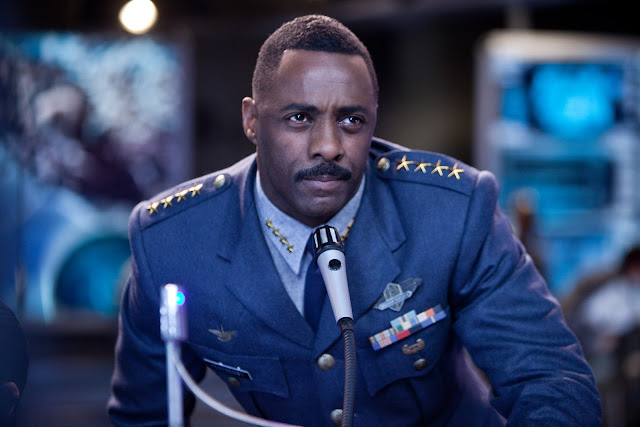
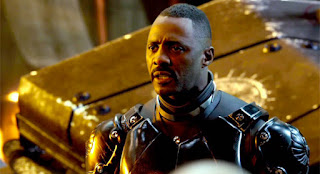

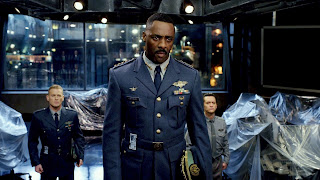
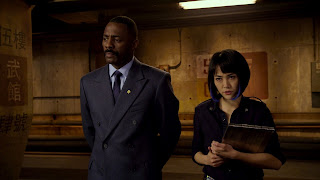
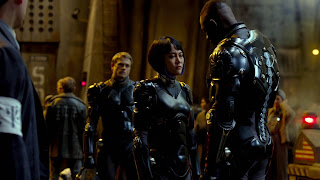


may be useful for all, helpful article once and pardon me permission to share also here :
ReplyDeleteObat luka tersiram air panas
Obat ginjal bengkak ampuh
Cara mengobati bisul secara alami
Obat tumor jinak tanpa operasi
Cara mengatasi lambung bocor
Cara mengatasi nyeri sendi
Obat penurun kolesterol tinggi
This is an amazingly perceptive analysis of a very subversive movie. As stated, all the above occurs in a movie that, for lesser intellects, could be confused with a slam-bang action movie, which it really isn't. There are at least three sub-threads in the movie that are antithetical to the genre. But the strongest is the father/daughter/general character which in ANY other movie would be a standard white generic male...and in this film is Idris ELba, most assuredly not that. He's wonderful in the role,as he usually is, and the subverts the character, wich he often does - he did co-star with Beyonce' you know. But PacRim is worth multiple viewings, believe me.
ReplyDeletehigh profile escort service in kolkata
ReplyDeletehot kolkata escort
hotels available escort service at kolkata
indian girls escort kolkata
indian girls escort kolkata for tuor bankok
kolkata airhostess escort
kolkata escort acriccs
kolkata escort cctv videos
kolkata escort girl fuck video
kolkata escort service cheap rate
kolkata escorts
escort service in kolkata
KOLKATA ESCORTS
ReplyDeleteKOLKATA ESCORT
KOLKATA ESCORT SERVICE
KOLKATA INDEPENDENT ESCORTS
KOLKATA INDEPENDENT ESCORT
ESCORT IN KOLKATA
ESCORTS IN KOLKATA
VILLAGE CALL GIRLS
VILLAGE CALL GIRL
CALL GIRL
CALL GIRLS
ESCORT
ESCORTS
KOLKATA FEMALE ESCORTS
KOLKATA HOTEL ESCORTS
KOLKATA MODEL ESCORTS
KOLKATA CALL GIRL
KOLKATA CALL GIRL SERVICE
KOLKATA CALL GIRL SERVICE
KOLKATA CALL GIRLS
CALL GIRL
CALL GIRLS
CALL GIRLS SERVICE
CALL GIRL SERVICE
KOLKATA INDEPENDENT CALL GIRLS
KOLKATA INDEPENDENT CALL GIRL
ESCORT
ESCORTS
ESCORTS SERVICE
it can be physically very though or impossible for some people all together. bunk bed with slide
ReplyDeleteThere are three basic types of spring mattresses. A continuous spring mattress is made from a single piece of wire woven into many springs. The springs are linked in a vertical pattern. fleet mattress
ReplyDelete